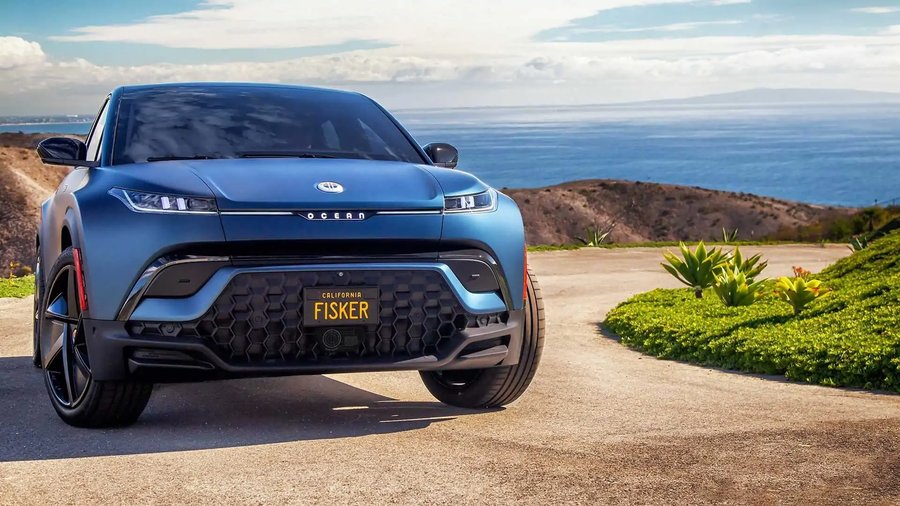Fisker Ocean Owners Are Lawyering Up To Keep Their Cars Running

Fisker, the once high-flying California-based EV startup, is bankrupt. That's left people who bought its Ocean SUV scrambling for answers about the future of software updates, internet connectivity, repairs and spare parts. After all, the Ocean was never fully fleshed out to begin with, making the uncertainty around long-term support that much more worrisome.
Some Fisker customers are channeling those concerns into action, forming the Fisker Owners Association (FOA) last month. The 2,000-member group hopes to help keep Oceans in good working order over the long term—and advocate for the interests of owners right now. To that end, the FOA said on Wednesday that it retained a law firm, Cooley, to represent Ocean owners in Fisker's bankruptcy proceedings.
So, what does the FOA want to get out of lawyering up? At first, the organization thought it would be nice for owners to get paid out for their vehicles' warranties, said José De Bardi, a Fisker owner in the U.K. and one of the FOA's founders. Soon the group realized that, with so many large creditors in the mix, that wouldn't be realistic.
"The reality is, we're probably not going to get that. What's significantly more important is the ability for us to continue using our cars," De Bardi said.
Owners, who paid up to $70,000 for their Oceans during the year it was on sale, want to win some guarantees about the availability of spare parts. Those were hard to come by even when Fisker was fully operational, InsideEVs has reported. So they'd like access to whatever parts are lying around and are hoping to set up a steady supply.
"There's a whole, long complicated mess just around parts supply," De Bardi said. "Obviously, that's key if we want to keep cars on the road, because things will break."
The other big problem area is software. That's what makes the Fisker Ocean different from a car like a Delorean DMC-12, which also lost manufacturer support but really only needed mechanical fixes to stay chugging along. The Ocean's reliance on modern vehicle software means you can't just take it to the mechanic down the street to fix an issue or swap out a faulty part.
So the FOA is fighting for access to Fisker's vehicle diagnostics tool, De Bardi said, which is necessary for sussing out issues and making repairs. The group also wants a solution for the day when Fisker's cloud infrastructure goes dark. Strangely enough, De Bardi said, Oceans need to connect to that cloud for basic features including the sunroof and doggy windows (little windows by the liftgate that are a unique Ocean feature) to function.
De Bardi said owners aren't sure what else may go wrong on the cars if that cloud or the Ocean's internet connectivity drop out for an extended period. So the group is trying to plan for that—by either arranging for maintenance of the cloud or pushing for some features to function locally in the vehicle.
"We're not expecting these cars to still be able to stream Netflix in 20 years' time, but in 10 years' time, you should still be able to open your sunroof," De Bardi said.
Cellular service that's currently provided by T-Mobile is another concern, De Bardi said, since that supports key features like navigation. The association, which De Bardi said includes lots of technically inclined owners, is also interested in striking licensing deals to maintain or improve certain parts of the Ocean's software over time. (De Bardi himself is the CTO of a technology company.) For that, he said, they'd need permission from some third-party software providers.
There is new hope that Ocean owners can score some wins here. American Lease, a company in New York that leases out cars to ride-hailing drivers, has agreed to buy Fisker's remaining inventory of some 3,000 Oceans for up to $46.25 million. As part of that deal, which a Delaware bankruptcy court judge still needs to approve, Fisker will let the company access proprietary source code and software that's necessary for maintaining and improving Oceans.
To De Bardi, that signals that the FOA could gain similar levels of access. But it's also worrisome in the sense that another company can now gate-keep everything they need. Ideally, the FOA would work with American Lease, since they have shared goals here, he said.
If nothing goes the Fisker owners' way, the FOA may need to reverse engineer solutions to their many complex problems. But if they succeed, De Bardi said, their situation could become an example for what consumer rights look like in a digital age—when even your $70,000 car can lose software-based features in the blink of an eye.
"Should a manufacturer even have the capability to stop you opening your sunroof if they feel like their servers don't want to work one day, let alone bankruptcy?," De Bardi said. "If it all went our way and we achieved all of our stretch goals, it would be an incredible landmark case."
Related News
